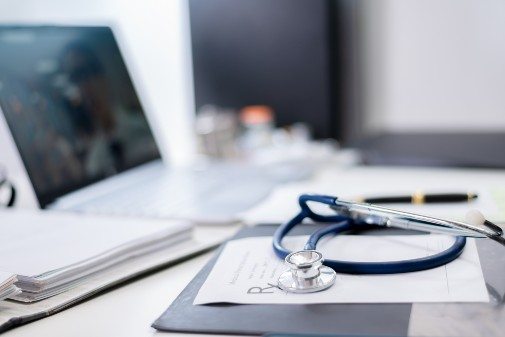GPs faced pressures of workload, personal risk and public scrutiny during Covid-19, study reveals
Posted on 18 January 2023
 GPs described a ‘tsunami’ in workload and lack of resources.
GPs described a ‘tsunami’ in workload and lack of resources.
The study - by the University of York and funded by the National Institute for Health and Care Research - examined nearly 100,000 social media posts by NHS GPs to identify matters that were important to them during the first year of the pandemic. This enabled trends in the social commentaries of GPs to be analysed, showing pressures varied over the course of the pandemic.
Safety
Online discussions at the start of the pandemic centred around lack of personal protective equipment (PPE) and testing, leading to anxiety about their own safety and the safety of their families. Some GPs felt that they were viewed as lower priority compared with hospital staff.
GPs described a ‘tsunami’ in workload and lack of resources, leaving many feeling ‘fatigued’ or ‘exhausted.’ GPs were fearful about patients’ unmet health care needs and ‘heartbroken’ by patient deaths and social isolation during the pandemic.
Sentiments moved on to expressions of low morale and feeling undervalued later (September – October 2020), exacerbated by a perceived lack of support from the government, media and the general public – referred to by many as ‘GP bashing’. Perceptions that GP practices were ‘closed’ and some cases of abuse from patients caused sadness amongst GPs who described working harder than ever.
Workload
GPs felt positive about some changes that were necessitated by the pandemic – particularly the investment in IT infrastructure. And they commented on the overwhelming sense of satisfaction and hope brought about through the vaccination programme, although it also increased their workload further.
Dr Su Golder from the Department of Health Sciences said: “GPs were concerned about some aspects of remote consultations – particularly about possible missed diagnoses, widening health inequalities and the increased time and staff fatigue associated with remote consultations.
Dr Laura Jefferson, also from the Department of Health Sciences, added: “They felt job satisfaction, team working and access to much-needed emotional support, were all reduced by remote working.
“Problems contacting patients were common and working from home brought about additional challenges, especially for those with children.”
Pressures
Social media analysis provides a useful way of exploring experiences and perceptions in real time, without needing to burden busy health professionals with surveys or interviews.
The study concluded that perceived workload pressures, unsafe working practices, lack of support and unfavourable media commentaries during this time were detrimental to GPs’ wellbeing and this could affect GP retention and future patient care.
Further information:
The project is independent research commissioned and funded by the NIHR Policy Research Programme (Exploring the impact of COVID-19 on GPs’ wellbeing, NIHR202329)
The views expressed in this publication are those of the author(s) and not necessarily those of NIHR or the Department of Health and Social Care.
The mission of the National Institute for Health and Care Research (NIHR) is to improve the health and wealth of the nation through research. We do this by:
- Funding high quality, timely research that benefits the NHS, public health and social care;
- Investing in world-class expertise, facilities and a skilled delivery workforce to translate discoveries into improved treatments and services;
- Partnering with patients, service users, carers and communities, improving the relevance, quality and impact of our research;
- Attracting, training and supporting the best researchers to tackle complex health and social care challenges;
- Collaborating with other public funders, charities and industry to help shape a cohesive and globally competitive research system;
- Funding applied global health research and training to meet the needs of the poorest people in low and middle income countries.
NIHR is funded by the Department of Health and Social Care. Its work in low and middle income countries is principally funded through UK Aid from the UK government.
Explore more news

Sodium channels in breast cancer cells a promising target for future treatments, study reveals
Thursday 25 July 2024

Cooling the classroom: University of York researchers to investigate UK schools’ responses to hot weather
Wednesday 24 July 2024

Hunter-gatherers kept an 'orderly home' in the earliest known British dwelling, study shows
Tuesday 23 July 2024

Study uses Game of Thrones to advance understanding of face blindness
Tuesday 23 July 2024

York academic contributes to new report on men’s health which reveals disparities between most and least deprived areas in the UK
Wednesday 17 July 2024
Media enquiries
About this research
The study was led by the University of York and funded by the National Institute for Health and Care Research. The paper “General Practitioner perspectives and wellbeing during the COVID-19 Pandemic: a mixed method social media analysis” is published in Health Information and Libraries Journal.
